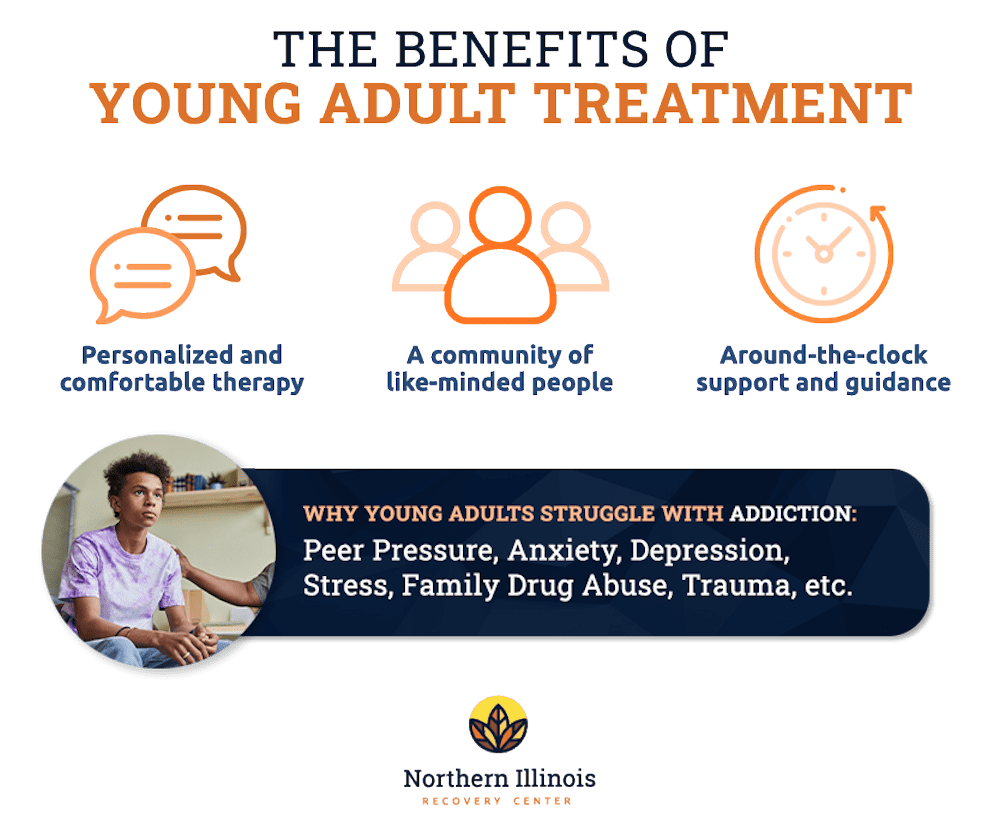Are you or a loved one currently suffering from a drug or alcohol addiction? If so, there is help at our young adult rehab center. We offer a wide range of treatments and therapies for young adults. Regardless of what alcohol or drug addiction you may be suffering from, our young adult addiction treatment specialists are here to help you through every stage of recovery.
We offer rehab programs for young adults that take you from detox through initial treatment & therapy and even extended or aftercare services. We provide everything you need to help you reset your life and get back on track without addiction. To find out more about our intensive outpatient program northern IL trusts, then contact us today.
- Cognitive behavioral therapy
- Group programs and individual therapy
- Family therapy
- Dual diagnosis therapy
- Relapse prevention and peer support
- Partial hospitalization and intensive outpatient therapy
We begin each program with a comprehensive assessment based on observation and discussions with you. You can feel free to discuss your addiction, mental health issues you may be experiencing, or what you hope to get out of your treatment. We can then make recommendations on which program to enter and then explain how it will help you overcome your addiction.
Our young adult rehab center in northern IL is the kind of place where you can relax, feel at home, and know that you will get the support you need for recovery. Like you, our goal is to get the heart of the problem and develop a strategy for getting you back on your feet.

Why Do Young Adults Struggle With Addiction?
In addition to this, young people may be more likely to experiment with substances if they have a family history of addiction. This is because they may be more genetically predisposed to developing an addiction. Finally, mental health issues can also lead to substance abuse. Young adults who suffer from depression or anxiety may turn to drugs or alcohol in order to self-medicate. This can quickly lead to an addiction.
Peer pressure is the influence that friends, classmates, and other people have on each person’s behavior. It can be positive or negative. Positive peer pressure is when someone encourages another person to do something that is good for them, such as eating healthy foods or exercising regularly. Negative peer pressure is when someone pressures another person to do something that is harmful, such as smoking cigarettes or taking drugs.
If someone is regularly exposed to negative peer pressure, it can increase their chances of developing an addiction. This is because they may be more likely to try substances that are harmful, and they may find it harder to resist the pressure to keep using them. Additionally, people who are struggling with addiction may turn to their peers for support and validation, which can further reinforce addictive behaviors.
Anxiety can have a significant influence on substance abuse in young adults. Anxiety disorders are the most common mental health problem in the United States, and young adults are more likely to experience anxiety than any other age group. One in four American adults will suffer from an anxiety disorder at some point in their lives.
Anxiety disorders can lead to substance abuse in a number of ways. First, people with anxiety disorders may turn to drugs or alcohol in an attempt to self-medicate. Second, anxiety can lead to impaired judgment and decision-making, which can increase the risk of engaging in risky behaviors, including substance abuse. Finally, anxiety can trigger a spiral of negative emotions, including fear, guilt, and shame, which can lead to substance abuse as a way of numbing these difficult feelings.
In some cases, depression could lead a person to substance abuse. Depression is a serious mental illness that can have a major impact on a person’s life; it can interfere with work, school, and personal relationships. It can also lead to physical health problems.
One of the most serious potential complications of depression is addiction. People who are depressed are more likely to develop addictions to alcohol, drugs, or other substances. They may also be more likely to engage in risky behaviors, such as gambling or unprotected sex.
Depression can cause a person to turn to substance abuse as a way to cope with their feelings of sadness, loneliness, and despair. Substance abuse can provide short-term relief from these symptoms, but it ultimately makes the problem worse. In addition to the risks of addiction, substance abuse can also lead to financial problems, legal troubles, and relationship problems.
Why Don’t Young Adults Seek Treatment for Addiction?
Why is it Important for Young Adults to Develop Healthy Coping Skills?
Oftentimes, a young adult who may be struggling with some of these stressors seek balance in certain vices; these vices may include drugs and alcohol. When someone uses drugs and alcohol to balance out their stress, it is referred to as a coping mechanism. Coping with drugs and alcohol can lead to severe addiction. This is why it is imperative to seek out help and develop healthy coping skills.
Is There Addiction Treatment Available for Young Adults?
No one treatment program is right for everyone, so it’s important to work with a professional to find the best program for your needs. Individualized care is vital to a successful recovery experience. With the right help, young adults can overcome addiction and lead happy, healthy lives.
Our Outpatient and Partial Hospitalization Program
An intensive outpatient program allows you to participate in the same treatment as full hospitalization. You can meet with your therapist, be a part of our therapeutic activities, and also engage in a group session. You will also have full support from your family and friends that can hold you accountable.
Insurance Verification






We Offer Rehab for Young Adults
- Alcohol abuse
- Heroin addiction
- Opioid and opiate addiction
- Cocaine abuse
- Benzodiazepines abuse
- Marijuana
You may believe that your addiction is too severe and that your circumstances are too dire for you to seek treatment. However, as long as you are willing to take the first step to recovery, we can help you take every step after that until your treatment is completed. We also offer support groups and extended aftercare to help you keep going, long after your initial treatment is over.




